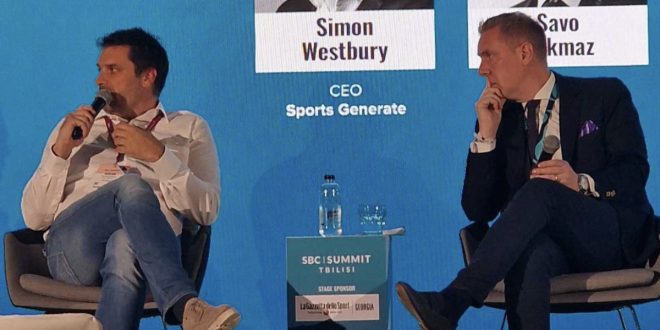In Tbilisi, the cultural dynamics of an evolving global gambling marketplace collide, as leadership contends with the generational ripples of an industry at a point of inflection.
In the context of Western participants in the gambling industry, the term “local champion” is often used, but it does not accurately reflect the complex structure and uniqueness of the successful gambling business in Eastern Europe.
At the opening of the SBC Summit Tbilisi, MaxBet CEO and CFO, Savo Bakmaz, spoke about the amazing development path of the Balkan operator: “from humble beginnings in a garage to a successful buyout by the largest company Flutter Entertainment.”
In January, Flutter began operations in the Balkan markets by acquiring a 51% stake in MaxBet for €140 million. MaxBet is the market leader in Serbia and the platform for Flutter’s international expansion into Croatia, Montenegro, Bosnia and Herzegovina, and North Macedonia.
For Bakmaz, MaxBet symbolizes the history of Balkan technology, a sector that has overcome significant socio-economic challenges through technological advances that contribute to the development of national economies: “We are part of a 30-year-old economy, but it was only until recently that we have garnered interest from Western investors.”
Thus, the acquisition of Flutter confirmed the success of MaxBet as one of the most important transactions of the last decade that had a positive impact on the Serbian economy.
The importance of cultural integration is especially relevant given the increased attention to the global gambling industry and its impact on new economies.
Simon Westbury, CEO of Sport Generate, said: “The challenge isn’t just about transferring a business model from one region to another. It’s about understanding and respecting the economic and cultural fabrics of those new markets you choose to enter.”
Westbury reflected on his career in developing gambling in new economies. Having worked for Digitain since 2019, he has witnessed the expansion of the “Armenian tech giant employing 4,000 staff globally”.
“I don’t want to make this sound colonial, but gaming companies have created a new socio-economic class in Armenia. Government incentives for IT and tech have developed wealth and there is now promotion of home ownership… that is a positive story.
“There are parts of Yerevan that remind me of when I was living in Dubai in 2006. The amount of construction that is going on and the empowerment of gaming companies have many dividends”.
Bakmaz agreed with Westbury regarding the positive economic contribution, but he emphasized the inherent contradictions that arise when balancing Western business practices with traditional Eastern European values in markets: “Public discussion of gambling on the streets can cause different attitudes among people.” Bakmaz noted that this is one of the most difficult tasks for MaxBet: “We had to change the perception of betting, and why people come to our shops.
“Our shops are not like Euro betting shops… They are very high class with a different offering, to change the perception of gambling. Customers are coming to our shops not just to gamble. They come to watch a game on HDTV, to socialize and relax, have a coffee or drink a beer with their friends”.
Bakmaz enthusiastically highlighted MaxBet’s key performance indicator for customers – “sales of more than 3 million cups of coffee annually, which he noted plays an important role in establishing trust among consumers.”
“We are changing the perception of the betting and gaming industry every day,” said MaxBet CEO, citing the need to maintain customer loyalty and improve operational security.
Predicting the future of Eastern European markets remains a cautious matter. However, Westbury confidently noted that interaction will be focused on the dynamics of “aging Western Europe meeting the demands of younger Eastern Europe.”
Westbury: “It’s not rocket science. Anyone in this room could sit here and say, understand your player, appeal to the player.
“We have to understand in our roles that we don’t know everything, employ people that are young and dynamic, understand what we’re trying to achieve and appeal to the player”.
“We talk about AI, we talk about eSports a lot of the time we’re talking nonsense, if I’m honest with you, this simply comes back to whether you are entertaining the end-user”.
In his closing remarks, Bakmaz emphasized the importance of ongoing dialogue between stakeholders in the East and West to align unique expectations. He noted:“As we continue to evolve, our focus remains on being a responsible leader in the industry, balancing growth with social responsibility and cultural sensitivity”.
Don’t forget to subscribe to our Telegram channel!










